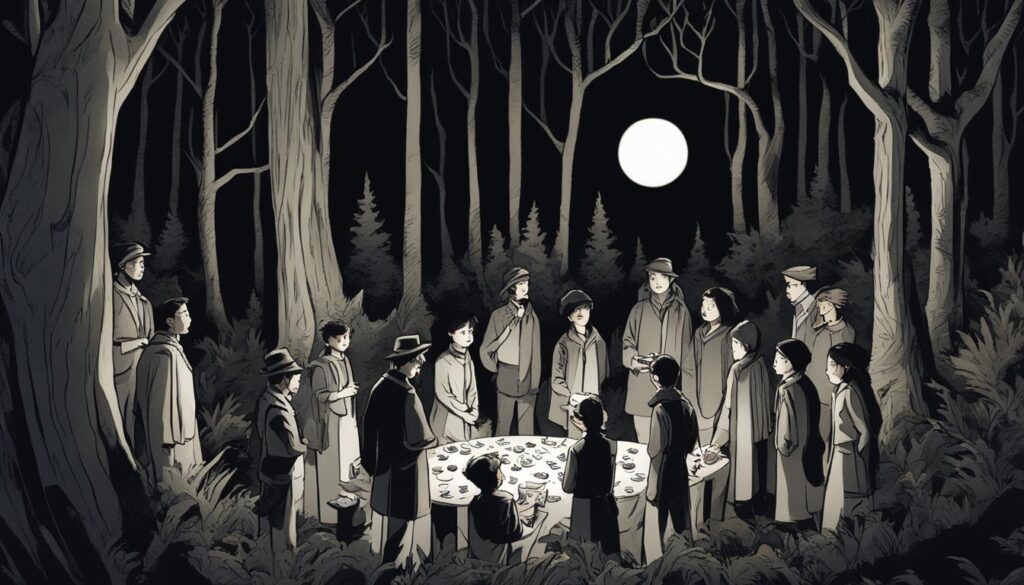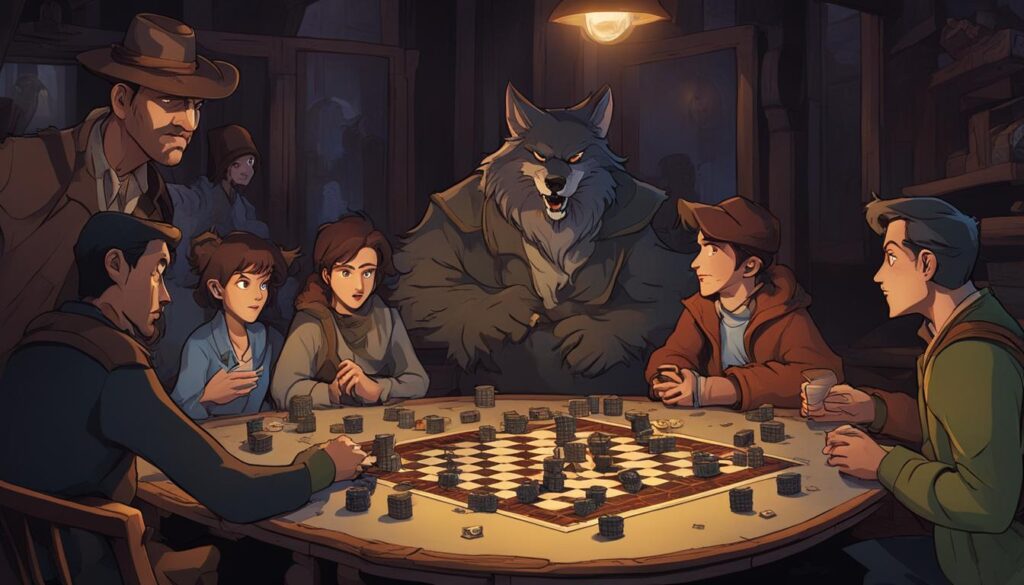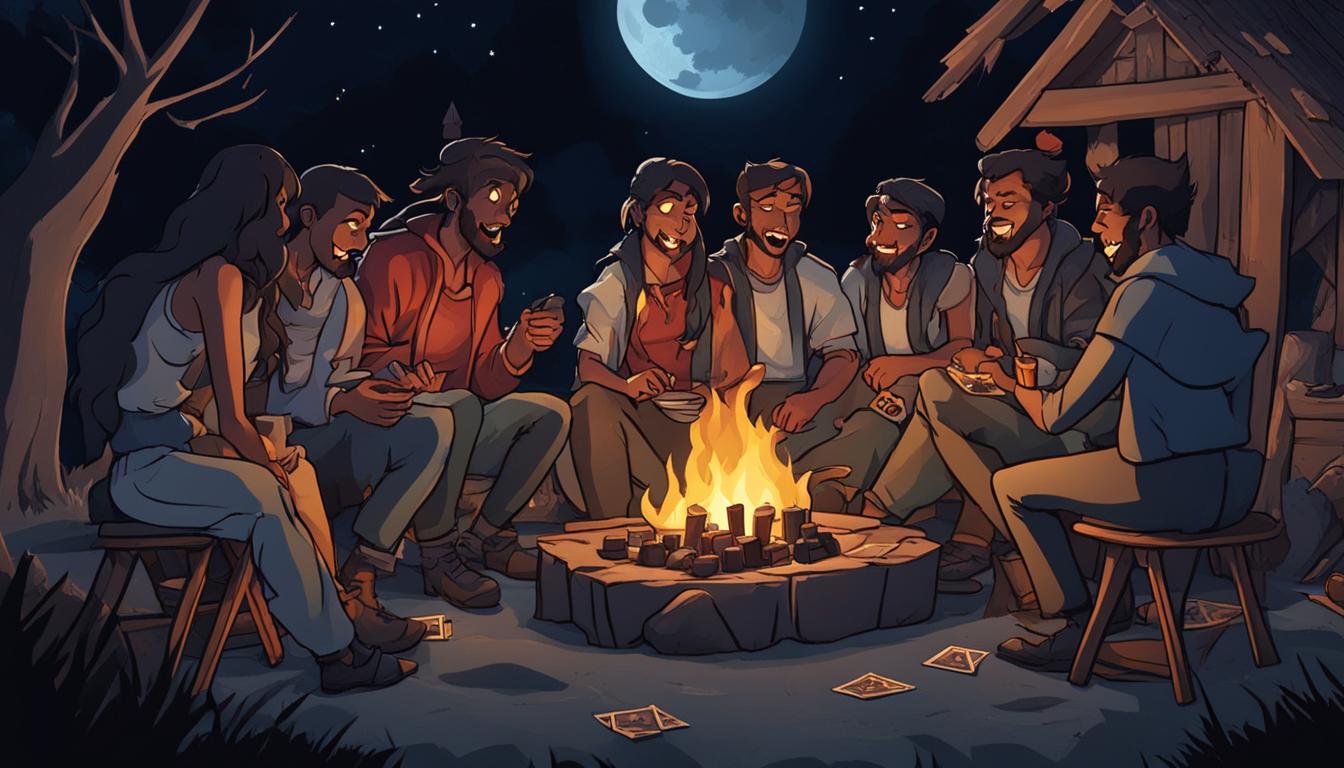Disclosure: This Post Contains Affiliate Links; We earn a commission on purchases.
The Werewolf Game is a thrilling and immersive activity that will have you on the edge of your seat. It’s a popular party game that combines strategy, deduction, and deception. In this article, we will explore how to set up the game, explain the rules and instructions, delve into the different roles and their functions, provide a guide for moderators, discuss strategies for winning, highlight ways to make it more fun as a party game, and explore variations to keep the gameplay fresh.
Whether you’re hosting a game night or looking for a new challenge to enjoy with friends and family, the Werewolf Game has something for everyone. Get ready to embrace the mystery, unravel hidden identities, and experience a howling good time!
Key Takeaways:
- Understanding the rules and instructions is crucial for a successful werewolf game setup.
- Assigning roles effectively and utilizing strategic gameplay can increase your chances of winning.
- Explore different variations of the game to add excitement and adapt to player preferences.
- A moderator plays a crucial role in overseeing the gameplay and ensuring fairness.
- Other social deduction games offer similar gameplay mechanics and can provide hours of entertainment.
Table of Contents
How to Set Up a Werewolf Game
Setting up a werewolf game is an exciting task that involves gathering a group of players, assigning roles, and preparing the game materials. Whether you’re hosting a small gathering or a larger party, the werewolf game can accommodate 4-10+ players, making it a versatile choice for any occasion.
First, it’s crucial to have a dedicated moderator who will oversee the gameplay. This person will ensure that the game progresses smoothly, keep track of time, and facilitate discussions among players. The moderator plays a pivotal role in maintaining fairness and creating an engaging experience for everyone involved.
Next, the players will take on various roles within the game. The classic werewolf game includes werewolves and villagers, but there are also unique characters with special abilities that can be added for additional complexity. Each role has its own objectives and abilities, creating a dynamic and suspenseful gameplay experience.
To set up the game, you’ll need a deck of werewolf game cards or slips of paper that represent the different roles. These can be easily printed or purchased online. Additionally, it may be helpful to have a game board or a designated area for players to gather and discuss the game.
Once the roles have been assigned and the game materials are prepared, the moderator will explain the rules and objectives of the game to the players. This ensures that everyone is on the same page and ready to dive into the thrilling world of werewolves and deception.
To add an engaging visual element to this section, here is an image related to setting up a werewolf game:
Werewolf Game Setup Checklist
| Items | Description |
|---|---|
| Group of players | Gather a diverse group of friends or party attendees who are interested in playing the game. |
| Moderator | Assign a responsible person to oversee the gameplay, explain the rules, and ensure fair play. |
| Werewolf game roles | Prepare werewolf game cards or slips of paper that represent the different roles in the game. |
| Game board or designated area | Set up a space where players can gather, discuss the game, and keep track of the gameplay. |
By following these steps and utilizing the provided checklist, you’ll be well-equipped to set up a thrilling and unforgettable werewolf game. So gather your friends, embrace the suspense, and let the howling fun begin!
Werewolf Game Rules and Instructions
The werewolf game is an exciting and interactive social deduction game that captivates players with its hidden identities and intense gameplay. To ensure fair play and an engaging experience, the game follows a set of rules and instructions that dictate how the game progresses and how players interact with each other.
The objective of the werewolf game is twofold. The villagers’ goal is to eliminate all the werewolves, while the werewolves aim to outnumber the villagers. The game progresses through alternating day and night phases, each with its own set of actions and activities.
Day Phase:
During the day phase, players openly discuss and debate to identify who they believe are the werewolves among them. Accusations are made, suspicions are raised, and players present their arguments to persuade others of their innocence or guilt. It is during this phase that the villagers decide on their next course of action, which may involve eliminating a player they suspect to be a werewolf.
Night Phase:
As the sun sets, the night phase begins, and players close their eyes. This is when the werewolves, guided by their keen senses, secretly choose a villager to eliminate. The werewolves must carefully strategize and select their targets while ensuring they remain undetected. Additionally, other roles with special abilities, such as the seer or doctor, may perform their actions and gather valuable information to aid the villagers in their quest to eliminate the werewolves.
The game continues to alternate between day and night until one of the factions achieves their objective or specific conditions are met. When the villagers successfully eliminate all the werewolves, the villagers emerge victorious. Conversely, if the werewolves can outnumber the remaining villagers, they achieve their goal and claim victory.
Understanding the werewolf game rules and instructions is crucial for a smooth and enjoyable gameplay experience. By following these rules, players can immerse themselves in the thrilling world of hidden identities, deception, and strategic gameplay. So gather your friends, sharpen your deduction skills, and embark on an unforgettable journey within the captivating world of the werewolf game.
Werewolf Roles and Their Functions
The werewolf game involves various roles, each contributing to the excitement and unpredictability of the gameplay. These roles are divided between the werewolves and the villagers, with each serving a specific purpose and possessing unique abilities. Understanding the different roles is crucial for strategic gameplay and increasing your chances of victory.
Roles
- Werewolves: The werewolves are the game’s main antagonists. Their goal is to eliminate villagers and outnumber them. During the night phase, werewolves secretly choose a villager to attack. They must use their cunning and deception to avoid detection by the other players.
- Villagers: The villagers form the majority of the players and strive to identify and eliminate the werewolves. They rely on deduction, logic, and discussions with other players to determine the true identities of werewolves. Their numbers are crucial for maintaining a balance of power.
- Seer: The seer has the ability to peer into the supernatural realm. Each night, the seer can choose a player to investigate and determine their role. This knowledge can be critical in identifying werewolves and protecting innocent villagers.
- Doctor: The doctor plays a vital role in the game, able to protect a player of their choice from the werewolves’ attacks. By healing or shielding potential werewolf targets, the doctor provides valuable support to the villagers’ cause.
- Sheriff: The sheriff is a trusted figure in the village, possessing the power to officially accuse a player of being a werewolf during the day phase. The sheriff’s accusation has significant influence and can sway the opinions of other players.
These are just a few examples of the roles that can be included in a werewolf game. Many variations exist, each with its own additions and modifications to enhance gameplay and introduce new challenges.
Understanding the different roles in a werewolf game is essential for strategic gameplay and securing victory. Each role brings its own set of abilities and objectives, adding depth and intrigue to the game. The werewolves, villagers, seer, doctor, and sheriff all play pivotal roles in shaping the outcome of the game.
By familiarizing yourself with the unique functions of each role, you can better anticipate the actions of other players and make informed decisions. Discovering hidden identities, forming alliances, and utilizing strategic abilities will maximize your chances of survival and achieving your goals in the werewolf game.
Werewolf Game Moderator Guide
A werewolf game is an exciting and immersive experience that requires a moderator to oversee the gameplay and ensure fair play. The role of the moderator is crucial in setting up the game, assigning roles to players, facilitating discussions, and resolving conflicts. To provide a smooth and enjoyable experience for all participants, the moderator must be familiar with the game rules, roles, and strategies. This comprehensive guide will equip aspiring werewolf game moderators with all the necessary knowledge and skills to successfully guide the game.
Setting Up the Game
Before the game begins, the moderator needs to ensure that all players understand the rules and objectives. It is essential to create an atmosphere of excitement and anticipation by explaining the unique dynamics of the werewolf game. Provide a thorough explanation of the roles and their functions while emphasizing the importance of maintaining secrecy and deception. Additionally, make sure to distribute the necessary game materials, such as role cards and voting tokens, to each player.
Assigning Roles
The role assignment process should be done carefully and without revealing any information to the players. Randomly distribute the role cards to ensure an unpredictable game, ensuring that each player receives only one card. Remind players to keep their roles secret and encourage them to fully immerse themselves in their assigned characters. Be prepared to answer any questions they may have regarding their roles or the game mechanics.
Facilitating Discussions
During the gameplay, the moderator takes on the responsibility of guiding the discussions and ensuring that all players have an opportunity to express their thoughts. Encourage active participation by creating a safe and inclusive environment where everyone feels comfortable sharing their suspicions, theories, and voting preferences. Moderators should remain neutral and unbiased, refraining from revealing any confidential information that might influence the flow of the game.
Resolving Conflicts
Conflicts and disputes may arise during the werewolf game, and it is the moderator’s role to address and resolve them impartially. Act as a mediator, carefully listening to each player’s perspective and evaluating the validity of their arguments. When necessary, intervene to clarify the rules or resolve misunderstandings. It is crucial to maintain a fair and balanced environment where all players feel heard and respected.
Strategies and Tips
As the moderator, your understanding of game strategies can greatly enhance the overall experience. Familiarize yourself with various strategies used by players in different roles to provide valuable insights and guidance. Additionally, consider implementing time limits for discussions and voting to ensure a smooth and efficient gameplay experience. Stay observant and attentive, as some players might attempt to influence or manipulate others. Remember to enforce the game rules consistently to maintain fairness.
“As a werewolf game moderator, your role is pivotal in creating a thrilling and immersive experience for all players. By effectively setting up the game, assigning roles, facilitating discussions, and resolving conflicts, you ensure that each participant has a memorable time filled with suspense, strategy, and camaraderie.”
Being a werewolf game moderator is an exciting and challenging task that requires organization, attentiveness, and the ability to handle unexpected situations. By following this guide, you will be well-prepared to lead a successful and engaging werewolf game that leaves participants howling for more.
Strategies for Winning the Werewolf Game
When it comes to the werewolf game, having a solid strategy can greatly increase your chances of coming out on top. Whether you’re a werewolf or a villager, here are some strategies to consider:
1. Assess the Situation:
Before jumping into action, take a moment to assess the current state of the game. Analyze the players’ behavior, voting patterns, and any available information. This will help you identify potential allies, threats, and the direction in which the game is heading.
2. Adapt to Your Role:
Depending on your assigned role, tailor your strategy accordingly. If you’re a werewolf, working collaboratively with other werewolves and trying to blend in with the villagers can be advantageous. Villagers, on the other hand, should focus on uncovering the werewolves through observation and deduction.
3. Build Trust:
Gaining the trust of other players is crucial to your survival in the werewolf game. Form alliances, share your suspicions, and present logical arguments to convince others of your innocence or the guilt of the werewolves. Building trust can help sway crucial votes in your favor.
4. Observe and Interpret:
Pay close attention to the behavior and statements of other players during the game. Look for inconsistencies, nervousness, or patterns that may reveal the true identities of the werewolves. Remember, their goal is to deceive, so keen observation and interpretation are key.
5. Use the Seer Wisely:
If you have the role of the Seer, use your abilities strategically. Identify potential werewolves and share your findings discreetly with trusted villagers. Revealing all your information at once may lead to the elimination of the Seer or cause chaos within the gameplay.
6. Be Vocal or Silent:
Decide whether you want to take an assertive or passive approach in the game. Being vocal and proactive can help sway opinions and lead the discussion, while staying silent and observing can provide valuable insight and allow you to control the flow of the game when necessary.
7. Timing is Everything:
Choose the right moment to reveal important information or make a decisive move. Timing is crucial in the werewolf game, as a poorly timed reveal can lead to suspicion, and a premature vote can result in the wrongful elimination of a player.
8. Adapt to the Game Dynamics:
As the game progresses, the dynamics and information available will change. Be adaptable and flexible in adjusting your strategy accordingly. Stay up-to-date with the actions and reactions of other players and adjust your plans accordingly to stay one step ahead.
9. Trust Your Instincts:
Lastly, trust your instincts. Intuition can play a vital role in the werewolf game. Pay attention to your gut feelings, but always back them up with logical reasoning and evidence when presenting your case to the other players.
| Strategy | Advantages |
|---|---|
| Assess the Situation | Gaining insights into player behavior |
| Adapt to Your Role | Tailoring strategy based on assigned role |
| Build Trust | Securing alliances and swaying votes |
| Observe and Interpret | Identifying werewolf patterns and inconsistencies |
| Use the Seer Wisely | Strategically utilizing the Seer’s abilities |
| Be Vocal or Silent | Choosing between assertiveness and observation |
| Timing is Everything | Selecting the right moment for key actions |
| Adapt to Game Dynamics | Flexibility in adjusting strategy as game progresses |
| Trust Your Instincts | Listening to your intuition and backing it up with reasoning |

Werewolf Party Game: How to Make It More Fun
Take your werewolf game to the next level by transforming it into a thrilling party experience. By adding thematic decorations, incorporating special cards, and embracing party elements, you can enhance the overall fun and excitement for all players. Additionally, consider exploring werewolf card games for a compact and portable version that can be played on the go or in small gatherings.
“The perfect combination of mystery, deception, and social interaction makes the werewolf game an ideal choice for parties and social gatherings.”
Add Thematic Decorations
Immerse your guests in the world of werewolves by creating a visually captivating atmosphere. Set the mood with dim lighting, creating shadows that add to the suspense. Hang werewolf-themed decorations such as fake cobwebs, eerie moon cutouts, and spooky forest backdrops to transport players into a mysterious realm. Adding props like werewolf masks or clawed gloves can also encourage immersive role-playing and enhance the overall experience.
Incorporate Special Cards
To add an extra layer of intrigue to your werewolf party game, consider incorporating special cards with unique abilities or twists. These cards can introduce new roles, unexpected events, or game-changing dynamics. For example, a “Cursed” card could turn an innocent villager into a werewolf, adding an element of surprise. Including these special cards will keep players on their toes and ensure every game is exciting and unpredictable.
Embrace Party Elements
Make your werewolf party game a memorable event by infusing it with entertaining party elements. Encourage players to come in costume as their assigned characters, adding a touch of theatrics to the game. Play spooky background music to create an eerie ambiance. You can also offer themed snacks and beverages, such as “Werewolf Punch” or “Vampire Bite” cocktails, to keep the party atmosphere going throughout the game.
With these tips, you can transform a regular werewolf game into an unforgettable party experience. The combination of immersive decorations, special cards, and party elements will ensure that everyone has a howling good time. So gather your friends, don your werewolf personas, and let the games begin!
Werewolf Game Variations: Adding a Twist to the Classic
The classic werewolf game is a thrilling and suspenseful activity that keeps players on the edge of their seats. To inject even more excitement and freshness into the gameplay, there are various werewolf game variations that you can explore. These variations introduce new elements, roles, and objectives, making each game unique and unpredictable.
1. Additional Roles
One popular werewolf game variation involves adding extra roles to the game. These roles can have special abilities or unique win conditions, which adds complexity and strategic depth to the gameplay. For example, you can introduce a “Guardian Angel” role who can protect players from being eliminated or a “Cupid” role who can create secret alliances between players.
2. Alternate Win Conditions
In the classic werewolf game, the objective is for the villagers to eliminate all the werewolves or vice versa. However, in this variation, you can introduce alternative win conditions to spice things up. For instance, you can have a win condition where the werewolves win if they can convert a certain number of villagers to their side before being discovered.
3. Special Abilities
Another way to add excitement to the game is by incorporating special abilities for certain roles. These abilities can grant players unique powers that can sway the balance of the game. For example, the “Seer” role could have the ability to see the true identity of one player each night, or the “Werewolf Hunter” role could have the power to eliminate a suspected werewolf without the need for a vote.
4. Rule Modifications
If you’re feeling adventurous, you can experiment with rule modifications to create a whole new werewolf game experience. This can include altering the voting process, changing the way roles are assigned, or introducing time constraints for discussions and voting. Rule modifications can bring a fresh perspective to the game and challenge players to adapt their strategies.
By exploring these werewolf game variations, you can keep the gameplay exciting and engaging, even for seasoned players. Remember to discuss and agree upon the variations with your group before starting the game to ensure everyone is on the same page. Are you ready to unleash the howling fun with these thrilling werewolf game variations?
Other Social Deduction Games to Try
If you enjoy the werewolf game, there are other social deduction games that you can try. These games follow similar gameplay mechanics, involving hidden identities and deduction. Popular social deduction games include Spyfall, The Resistance, One Night Ultimate Werewolf, and Secret Hitler. Each game offers a unique twist and provides hours of entertainment.
Take your social deduction skills to the next level with these thrilling games:
Spyfall
Enter the world of espionage in Spyfall, a game of deception and deduction. Players are assigned secret roles as either spies or civilians, except one player who is the spy-in-chief. The goal is to uncover the spy or maintain secrecy while navigating through various locations.
The Resistance
In The Resistance, players take on the roles of resistance fighters or spies. The resistance fighters aim to complete missions and expose the spies, while the spies try to sabotage the missions without revealing their identities. Trust, deception, and deduction are key in this intense battle for control.
One Night Ultimate Werewolf
Experience the adrenaline rush of One Night Ultimate Werewolf, a fast-paced game of hidden identities. Players are assigned different roles, including werewolves, villagers, and special characters, each with unique abilities and goals. The game is played over a single night, where players must deduce who the werewolves are and make crucial decisions to ensure their survival.
Secret Hitler
Immerse yourself in the political turmoil of Secret Hitler, a game set in 1930s Germany. Players are divided into liberals and fascists, with one player secretly taking on the role of Hitler. Liberals must work together to pass liberal policies and identify and stop Hitler, while fascists aim to elect Hitler as the chancellor and pass fascist policies. Can you maintain democracy or will the fascists gain control?
Expand your collection of social deduction games with these thrilling titles and challenge your friends to a battle of wits, strategy, and deception.

| Game | No. of Players | Playtime | Complexity |
|---|---|---|---|
| Spyfall | 3-8 | 15 minutes | Medium |
| The Resistance | 5-10 | 30 minutes | Medium |
| One Night Ultimate Werewolf | 3-10 | 10 minutes | Easy |
| Secret Hitler | 5-10 | 45 minutes | Medium |
The Thrill of Social Deduction Games
Social deduction games, such as the werewolf game, provide an exhilarating and unpredictable gaming experience. These games put players’ interpersonal skills, deception abilities, and deductive reasoning to the test. The excitement of bluffing, forming alliances, and uncovering hidden identities makes social deduction games a beloved choice for game enthusiasts.
Whether you’re strategizing with your friends or trying to outwit your opponents, social deduction games offer endless opportunities for excitement and intrigue. The element of surprise keeps players on their toes, as they never know who they can trust or what lies behind each player’s hidden identity.
“Social deduction games require players to think critically, read between the lines, and analyze each move. The thrill of uncovering the truth and outmaneuvering your opponents is what makes these games so addictive.”
If you’re a fan of intense mind games and strategic thinking, social deduction games like werewolf will undoubtedly captivate your interest. So gather your friends, prepare your poker face, and immerse yourself in the thrilling world of social deduction games!
Conclusion
The werewolf game setup provides an exhilarating and immersive experience for players of all ages. By understanding and following the werewolf game rules, effectively assigning roles, and employing strategic gameplay, you can enhance your chances of winning. Moreover, experimenting with different werewolf game variations and exploring other social deduction games can add excitement and variety to your gaming sessions.
Whether you’re a fan of the classic werewolf party game or prefer the convenience of a werewolf card game, the werewolf game offers endless entertainment and mystery. With its hidden identities and intense deduction, the werewolf game guarantees a howling good time!
So gather your friends, unleash your inner detective, and prepare for an unforgettable gaming experience with the werewolf game. From setting up the game to strategizing your way to victory, the werewolf game is sure to captivate players and keep them coming back for more. Don’t miss out on the excitement of social deduction games, and let the werewolf game ignite your gaming sessions with suspense and intrigue.

As the founder of Friends Game Night, Ryan channels his enthusiasm for gaming into a platform that celebrates the magic of gathering friends around the digital or physical tabletop. Through his website, Ryan shares insightful articles, reviews, and recommendations, aiming to inspire others to create their own memorable gaming moments.
Subscribe to Our Newsletter










